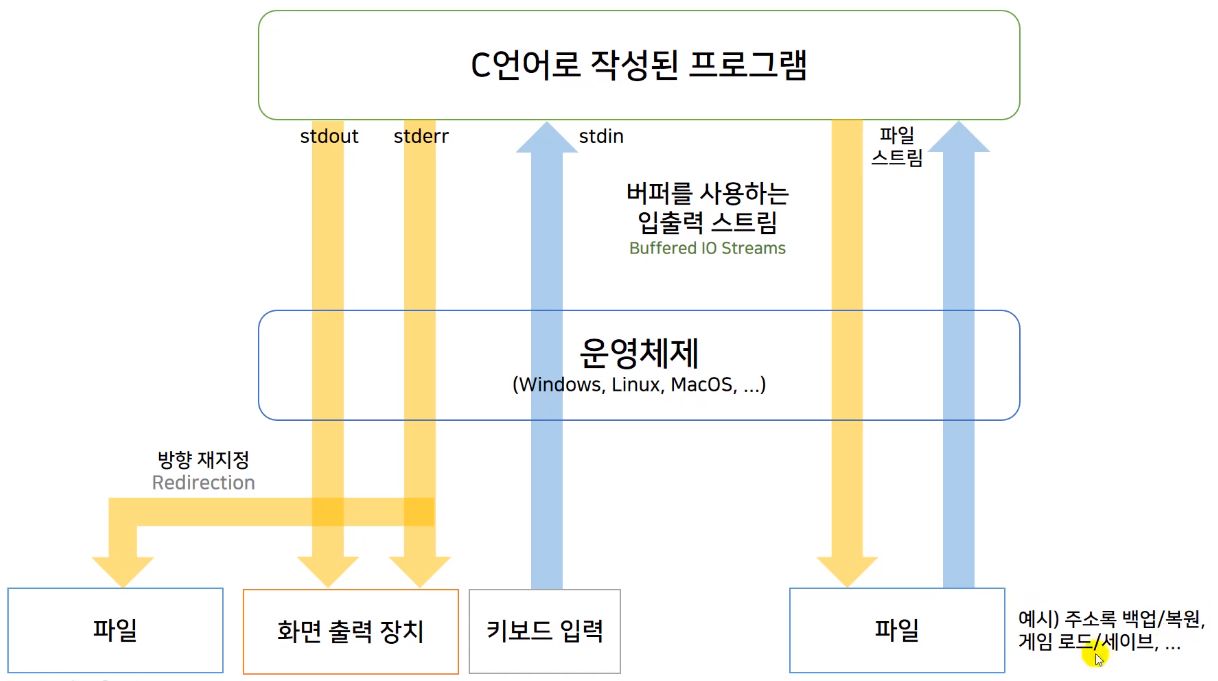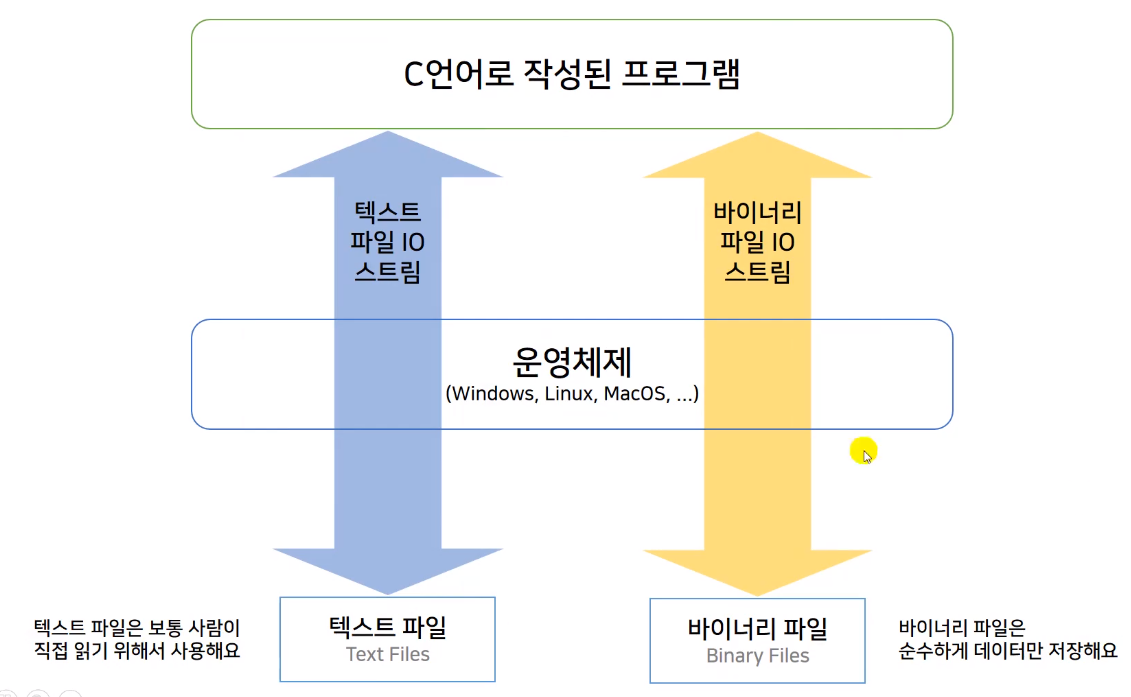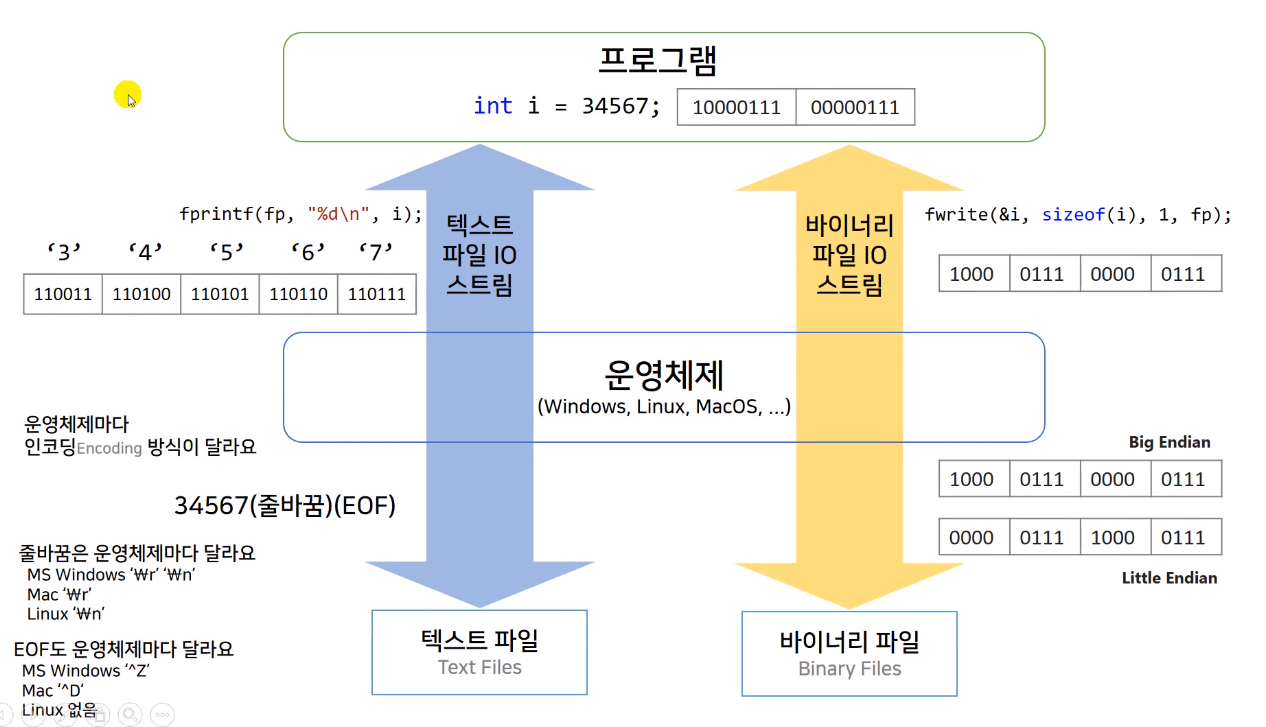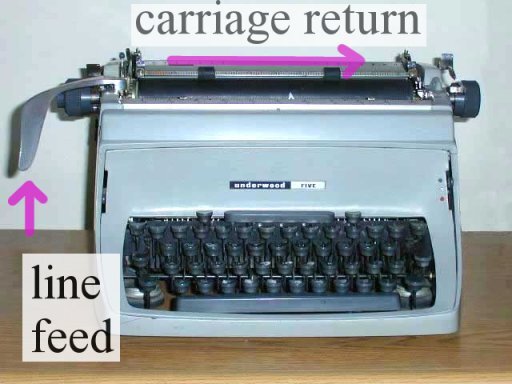배움 저장소
홍정모의 따라하며 배우는 C언어 13 파일 입출력 본문
13.1 파일 입출력의 작동 원리

- 프로그램을 실행하면 운영체재와 소통할 수 있는 채널이 3개 열린다. stdout, stderr, stdin이다.
- stdout과 stderr은 별도의 채널을 가지고 있다. redirection(파일의 출력값을 다른 파일의 입력값으로 사용) 때 이를
활용할 수 있다.
- 한 글자씩 통신하면 느리기 때문에 buffer를 이용하여 데이터를 주고받는다.
텍스트/바이너리 파일 주고받기

혼합하여 사용할 수 있다.

fprintf( ) 함수는 텍스트 파일 IO 스트림에 해당 데이터를 저장한다.
fwrite( ) 함수는 바이너리 파일IO 스트림에 해당 데이터를 저장한다.
13.2 텍스트 파일 입출력 예제
int main(int argc, char* argv[])
{
int ch;
FILE* fr, * fw; // FILE* is pointing to group of data (struct)
/*
typedef struct _iobuf
{
char* _ptr;
int _cnt;
char* _base;
int _flag;
int _file;
int _charbuf;
int _bufsize;
char* _tmpfname;
} FILE;
*/
unsigned long count = 0;
if (argc < 2)
{
printf("Usage: %s filename\n", argv[0]);
exit(EXIT_FAILURE);
}
else if ((fr = fopen(argv[1], "r")) == NULL) // Open file to read data
{ // ^ this argument is str not char!
printf("Cann't open %s\n", argv[1]);
exit(EXIT_FAILURE);
}
const char* out_filename = "output.txt";
if ((fw = fopen(out_filename, "w")) == NULL)
{
printf("Cann't open %s\n", argv[1]);
exit(EXIT_FAILURE);
}
while ((ch = fgetc(fr)) != EOF) // fgetc() == getc(), fgetc is more stable
{
//putc(ch, stdout); //same as putchar(ch) only difference is specificating exact stream
fputc(ch, stdout); // fputc() is stable version of putc()
fputc(ch, fw);
count++;
}
fclose(fr);
fclose(fw);
printf("\nFILE %s has %lu characters\n", argv[1], count);
printf("Copied to %s", out_filename);
}
Mode Specifier
| r | reading |
| w | creating-and-writing or over-writing |
| a | appending or creating-and-writing |
| r+ | both reading and writing (Not creating, the writing don't modify things in out of range) |
| w+ | reading and writing, over-writing or creating |
| a+ | reading and writing, appending or creating |
위의 specifier는 모두 char이 아닌 ch타입으로 사용된다. 따라서 double quotation(")을 쓰자.
13.3 텍스트 인코딩과 코드 페이지

CRLF
ㄴCarrige return:a control character or mechanism used to reset a device's position to the beginning of a line of text
ㄴLine Feed (LF) : new line in Unix

UTF-8, ANSI
UTF-8으로 저장했을 때 포맷이 맞지 않아 .c파일에서 깨진 한글이 나온다. ANSI로 변경해주면 포멧이 맞아 정상적으로 출력된다.
한글깨짐 해결방법 - 디코딩 해석 표 찾아주기
UTF-8으로 저장했을 때 깨지는 이유는 디코딩이 적절하지 않기 때문이다. 프로그래머가 임의로 지정해줄 수 있다. SetConsoleOutputCP(CP_UTF8)를 사용해주자.
#include <windows.h> // SetConsoleOutputCP( ) CP for CodePage
int main(int argc, char* argv[])
{
const UINT default_cp = GetConsoleOutputCP(); // Check What codepage you use
printf("%u \n", default_cp);
SetConsoleOutputCP(CP_UTF8); // UTF-8 Mode
int ch;
FILE* fr, * fw; // FILE* is pointing to group of data (struct)
const char* in_filename = "원본.txt";
const char* out_filename = "사본.txt";
unsigned long count = 0;
if ((fr = fopen(in_filename, "r")) == NULL) // Open file to read data
{ // ^ this argument is str not char!
printf("Cann't open %s\n", in_filename);
exit(EXIT_FAILURE);
}
if ((fw = fopen(out_filename, "w")) == NULL)
{
printf("Cann't open %s\n", out_filename);
exit(EXIT_FAILURE);
}
while ((ch = fgetc(fr)) != EOF) // fgetc() == getc(), fgetc is more stable
{
//putc(ch, stdout); //same as putchar(ch) only difference is specificating exact stream
fputc(ch, stdout); // fputc() is stable version of putc()
fputc(ch, fw);
count++;
}
fclose(fr);
fclose(fw);
printf("\nFILE %s has %lu characters\n", in_filename, count);
SetConsoleOutputCP(default_cp); // ISO 2022 Korean
printf("Copied to %s", out_filename);
printf("한글 출력 테스트!");
}SetConsoleOutputCP(CP_UTF8)를 사용하면 cmd console에서 한글이 출력되지 않는다. 파일을 입출력할 때만 CP_UTF8를 사용하자. CMD Console을 사용할 때는 default_cp로 되돌리면 한글이 깨지지 않고 출력된다.
13.4 텍스트 파일 입출력 함수들
fscanf(FILE* const _Stream, char const* const _Format, ...)
- Stream에 stdin을 넣으면 scanf( )처럼 사용할 수 있다. _Format은 string + format specifier를 넣고 그 이후에는 format specifier에 맞는 변수를 입력한다.
- fscanf( ) 함수는 입력받은 문자열 개수를 반환한다.
#define MAX 31
int main(int argc, char* argv[])
{
FILE* fp;
char words[MAX] = { '\0', };
const char* filename = "record.txt";
if ((fp = fopen(filename, "w+")) == NULL)
{
fprintf(stderr, "Can't open \"%s\" file.\n", filename); // redirect this in two ways
exit(EXIT_FAILURE); // 1.stdout 2.stderr
}
while ((fscanf(stdin, "%30s", words) == 1) && (words[0] != '.') )
fprintf(fp, "%s\n", words);
//while ((fgets(words, MAX, stdin) != NULL) && (words[0] != '.'))
// fputs(words, fp);
rewind(fp); /* go back to beginning of file */
while (fscanf(fp, "%s", words) == 1) // if fscanf( ) meet EOF then return -1
fprintf(stdout, "%s\n", words); // same as "fscanf(...) != EOF"
//while (fgets(words, MAX, fp) != NULL) // EOF check
// fputs(words, stdout);
if (fclose(fp) != 0)
fprintf(stderr, "Error closing file\n");
}
fsacnf( )함수로 txt파일의 특정한 값만 읽어보자.
아래 abc.txt 파일에 3번째 문자열만 읽고 싶을 때 fsacnf( )를 활용할 수 있다.
abc.txt
NAME AGE CITY
abc 12 hyderbad
bef 25 delhi
cce 65 bangaloremain.c
/*c program demonstrating fscanf and its usage*/
#include<stdio.h>
int main()
{
FILE* ptr = fopen("abc.txt","r");
if (ptr==NULL)
{
printf("no such file.");
return 0;
}
char buf[100];
while (fscanf(ptr,"%*s %*s %s ",buf)==1)
printf("%s\n", buf);
return 0;
}출처 https://www.geeksforgeeks.org/scanf-and-fscanf-in-c-simple-yet-poweful/
fscanf() vs fgets()
- fscanf는 줄바꿈, 띄어쓰기 입력으로 변수를 구분한다. 더 이상 변수가 없으면 함수 실행이 종료된다.
- fgets는 줄바꿈만 이전과 같은 역할을 한다 띄어쓰기는 영향을 주지 않는다..
- fsacnf는 format specifier의 개수만큼 입력받고 입력받은 수를 반환한다. fgets는 입력받은 문자열 포인터를 반환한다.
fgets()로 파일쓰기
#define LINE_MAX 20
int main()
{
FILE* fp = fopen("test.txt", "r");
FILE* fw = fopen("create.txt", "w");
char line[LINE_MAX];
while (fgets(line, LINE_MAX, fp)) {
printf("%s", line);
fputs(line, fw);
}
}13.5 바이너리 파일 입출력
fopen( ) mode string for binary IO
기본 Mode Specifier에 'b'를 붙여주면 된다
| rb | reading |
| wb | creating-and-writing or over-writing |
| ab+ | a+b | appending or creating-and-writing |
| wb+ | w+b | reading and writing, over-writing or creating |
| ab+ | a+b | reading and writing, appending or creating |
C11 'x' mode fails if the file exists, instead of overwriting it.
"wx", "wbx", "w+x", "wb+x", "w+bx"
binary 파일 쓰기 예제
FILE* fp = fopen("binary_file", "wb");
double d = 1.0 / 3.0;
int n = 11;
int* p_arr = (int*)malloc(sizeof(int) * n);
if (!p_arr) exit(1);
for (int i = 0; i < n; ++i)
*(p_arr + i) = i * 2;
fwrite(&d, sizeof(d), 1, fp);
fwrite(&n, sizeof(n), 1, fp);
fwrite(p_arr, sizeof(p_arr), n, fp);
fclose(fp);
free(p_arr);
// total size = double + int + int * 111 = 8 + 4 + 444 = 456byte
binary 파일 읽기 예제
- binary 파일은 파일의 형식을 모르면 알 수 없다. (자료형을 알고 있어야 한다.)
- EOF(-1)은 더이상 값을 읽을 수 없을 때 feof로 확인되는 값이다.
// If you didn't know the format
// Hard to decoding binary file.
FILE* fp = fopen("binary_file", "rb");
double d;
int n;
fread(&d, sizeof(d), 1, fp);
fread(&n, sizeof(n), 1, fp);
int* p_arr = (int*)malloc(sizeof(int) * n);
if (!p_arr) exit(1);
fread(p_arr, sizeof(int), n, fp); // If buffer is full, save it and load again
printf("feof = %d\n", feof(fp)); // does FILE meet EOF? No.it pointing the last element
printf("%f \n", d); // So return 0
printf("%d \n", n);
for (int i = 0; i < n; ++i)
printf("%d ", *(p_arr + i));
printf("\n");
fread(&n, sizeof(n), 1, fp); // read one more toward EOF
printf("feof = %d\n", feof(fp)); // Does FILE meet EOF? Yes return 1
printf("ferror = %d\n", ferror(fp));// No error. return 0
fwrite(&n, sizeof(n), 1, fp); // read only, raise error
printf("ferror = %d\n", ferror(fp));// return 1 means error
fclose(fp);
free(p_arr);Output
feof = 0
0.333333
11
0 2 4 6 8 10 12 14 16 18 20
feof = 1
ferror = 0
ferror = 1fread( )함수의 반환값은 읽어들인 양으로 세 번째 Parameter에 의해 결정된다. 읽어들일 양이 Parameter 보다 적을 때 그만큼을 반환한다.
13.6 파일 임의 접근
TEXT파일 임의접근
long ftell(FILE*) : 읽어들일 위치를 반환한다(long type)
fseek(FILE*, long int offset, int origin) : 현재 위치를 지정한 곳에서 offset만큼 이동한다
/*
test.txt << "ABCDE...."
read 0-1byte, get A, pointing to 1byte add
read 1-2byte, get B, pointing to 2byte add
*/
int ch;
long cur;
FILE* fp = fopen("test.txt", "r");
cur = ftell(fp); // get current pointing position
printf("ftell() = %2ld \n", cur);
// Move 2 step forward
fseek(fp, 2L, SEEK_SET); // SEEK_SET is 0 position, move to 2byte (L for Long)
cur = ftell(fp);printf("ftell() = %2ld ", cur);
ch = fgetc(fp); printf("v: %d %c\n", ch, ch);
cur = ftell(fp);
printf("ftell() = %2ld \n", cur);
// Move 2 step backward
fseek(fp, -2L, SEEK_CUR); // SEEK_CUR is current position
cur = ftell(fp);printf("ftell() = %2ld ", cur);
ch = fgetc(fp); printf("v: %d %c\n", ch, ch);
// Move to EOF
fseek(fp, -1L, SEEK_END); // SEEK_END is last position
cur = ftell(fp); printf("ftell() = %2ld ", cur);
ch = fgetc(fp); printf("v: %d %c\n", ch, ch);
// Move to last element
fseek(fp, 0L, SEEK_END); // SEEK_END is last position
cur = ftell(fp); printf("ftell() = %2ld ", cur);
ch = fgetc(fp); printf("v: %d %c\n", ch, ch);
fsetpos( ), fgetpos( )
-파일의 크기가 long타입을 넘어서면 fsetpos( )와 fgetpos( )함수를 쓰자.
= fseek( ) = ftell( )
-MSVC에서 위치를 저장하는 fpost_t 타입은 long long이다.
fpos_t pt;
pt = 10;
fsetpos(fp, &pt); // == fseek( )
ch = fgetc(fp); printf("v: %d %c\n", ch, ch);
fgetpos(fp, &pt); // == ftell( )
printf("fgetpos() = %lld ", pt);
Binary파일 임의접근
// Write
FILE* fp = fopen("binary", "wb");
for (int i = 0; i < 20; ++i)
{
double d = i * 1.11;
fwrite(&d, sizeof(double), 1, fp);
}
fclose(fp);
// Read
fp = fopen("binary", "rb");
long cur;
double d;
cur = ftell(fp);
printf("Before reading %2ld\n", cur); // >> Before reading 0
fread(&d, sizeof(double), 1, fp);
cur = ftell(fp);
printf("After reading %2ld ", cur); // >> After reading 8 v : 0.000000
printf("v : %f\n", d);
fread(&d, sizeof(double), 1, fp);
cur = ftell(fp);
printf("After reading %2ld ", cur); // >> After reading 16 v : 1.110000
printf("v : %f\n", d);
fseek(fp, 88L, SEEK_SET);
fread(&d, sizeof(double), 1, fp);
cur = ftell(fp);
printf("After seek %2ld ", cur); // >> After seek 96 v : 12.210000
printf("v : %f\n", d);
fclose(fp);
13.7 기타 입출력 함수들 ungetc( ), fflush( ), setvbuf( )
ungetc( )
해당 문자를 buffer에 넣는다. 다음 예제는 파일 test.txt << "Hello"를 사용하였다.
int ch;
FILE* fp = fopen("test.txt", "r");
/* ungetc() : read 1 letter and load it to buffer */
ch = fgetc(fp);
fputc(ch, stdout);
//ungetc(ch, fp);
ch = fgetc(fp);
fputc(ch, stdout);
// keep comment | uncomment
// >> He | >> HHint ch;
FILE* fp = fopen("test.txt", "r");
/* ungetc() : read 1 letter and load it to buffer */
ch = fgetc(fp);
fputc(ch, stdout);
ungetc((int)'A', fp);
ch = fgetc(fp);
fputc(ch, stdout);
ch = fgetc(fp);
fputc(ch, stdout);
// >> HAe
setvbuf( ) :
기본 buffer를 내가 만든 변수로 바꿀 수 있다.
// change the settings of buffer
int ch;
FILE* fp = fopen("test.txt", "r");
char buffer[4] = { '\0', }; // use this array as a buffer
setvbuf(fp, buffer, _IOFBF, sizeof(buffer)); // _IOLBF, _IOFBF, _IONBF
ch = fgetc(fp); // Read only a character
// dump buffer
for (int i = 0; i < sizeof(buffer); ++i)
printf("%c", buffer[i]);
fclose(fp);_IOLBF : L=line 라인을 만나면 저장 (사용환경에 따라 다를 수 있다)
_IOFBF : F=Full 통째로 저장
_IONBF : N=No 저장하지 않음
ch=fgetc(fp)를 실행하여 문자 하나를 읽어왔지만 아래 for 반복문의 실행해보면 Hell이 출력된다.
ch=fgetc(fP)가 실행될 때 buffer의 크기만큼 데이터를 읽어온다.
fflush( ) : file flush(물내리기)
버퍼가 빌 때까지 특정 작업을 실행시킨다.
fflush(fp); // work untill buffer is empty
13.8 텍스트 파일을 바이너리처럼 읽어보기
test.txt
Hello World
First
Second// #include <windows.h>
unsigned char ch;
double d;
FILE* fp = fopen("test.txt", "rb");
SetConsoleOutputCP(CP_UTF8);
while (fread(&ch, sizeof(unsigned char), 1, fp) > 0)
printf("%3hhu %c \n", ch, ch);
fclose(fp);fread( )함수의 반환값은 읽어들인 양으로 세 번째 Parameter에 의해 결정된다. 읽어들일 양이 Parameter 보다 적을 때 그만큼을 반환한다.
72 H
101 e
108 l
108 l
111 o
32
87 W
111 o
114 r
108 l
100 d
13
10
70 F
105 i
114 r
115 s
116 t
13
10
83 S
101 e
99 c
111 o
110 n
100 dwindows는 EOF에 별도표시를 하기위해 한 글자를 추가한다. Linux는 하지 않는다. 줄바꿈기호, 시작지점 기호는 운영체제마다 다르다. 텍스트 파일을 저장할 때는 운영체제가 추가적인 작업을 하기 때문에 텍스트 파일의 입출력은 운영체제마다 다르게 나타난다.
한글은 byte 3개를 하나의 문자로 표시하고 있다.
'Programming Language > C' 카테고리의 다른 글
| [홍정모의 따라하며 배우는 C언어] 15.비트다루기 (0) | 2021.12.07 |
|---|---|
| [홍정모의 따라하며 배우는 C언어] 14. 구조체 (0) | 2021.12.05 |
| 홍정모의 따라하며 배우는 C언어 12. Storage Classes, Linkage and Memory Management (0) | 2021.11.27 |
| 홍정모의 따라하며 배우는 C언어 11 문자열 함수 (0) | 2021.11.24 |
| 홍정모의 따라하며 배우는 C언어 10.배열과 포인터 (0) | 2021.11.22 |




